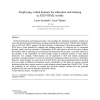1235 search results - page 243 / 247 » Formalizing information security knowledge |
112
click to vote
IJCAI
1993
15 years 3 months ago
1993
agent-oriented system. We show the complexity to be linear time for one of these logics and polynomial time for another, thus providing encouraging results with respect to the prac...
129
click to vote
ATAL
2010
Springer
15 years 3 months ago
2010
Springer
A voting rule is an algorithm for determining the winner in an election, and there are several approaches that have been used to justify the proposed rules. One justification is t...
131
Voted
COMCOM
2008
15 years 2 months ago
2008
In this paper, we study using game theory the problem of detecting intrusions in wired infrastructure networks. Detection is accomplished by sampling a subset of the transmitted p...
117
click to vote
CORR
2006
Springer
15 years 2 months ago
2006
Springer
The study of networked systems is an emerging field, impacting almost every area of engineering and science, including the important domains of communication systems, biology, soc...
137
click to vote
CE
2007
15 years 2 months ago
2007
Web-based education and training provides a new paradigm for imparting knowledge; students can access the learning material anytime by operating remotely from any location. Web3D ...

